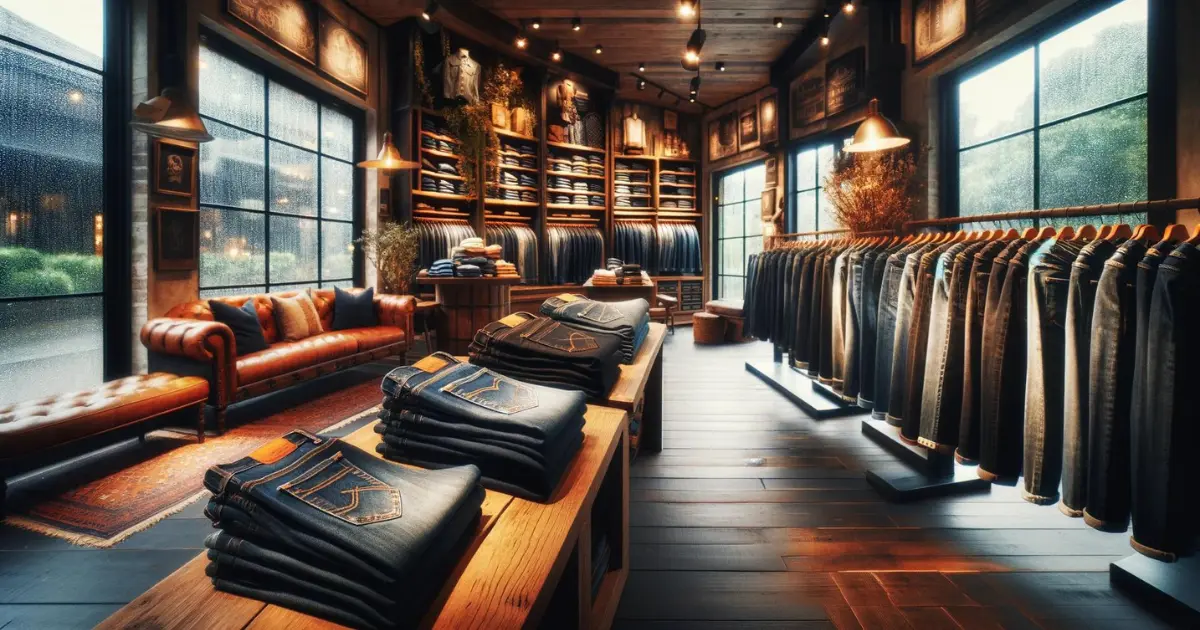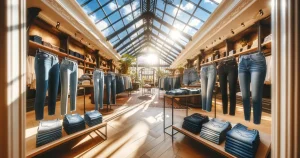Denim, a ubiquitous fashion essential, is commonly found in wardrobes but is notorious for its environmental toll due to resource-intensive and chemically heavy production processes. With a focus on sustainability, AI has curated the top 10 men’s jeans brands for 2024. These selected brands are not just fashion-forward but also pioneers in minimizing denim’s ecological impact. They inspire us to reconsider jeans not just as a trend but as a conscious, more responsible choice in an effort to mitigate their inherent environmental challenges.
The Problems in the Jeans Industry
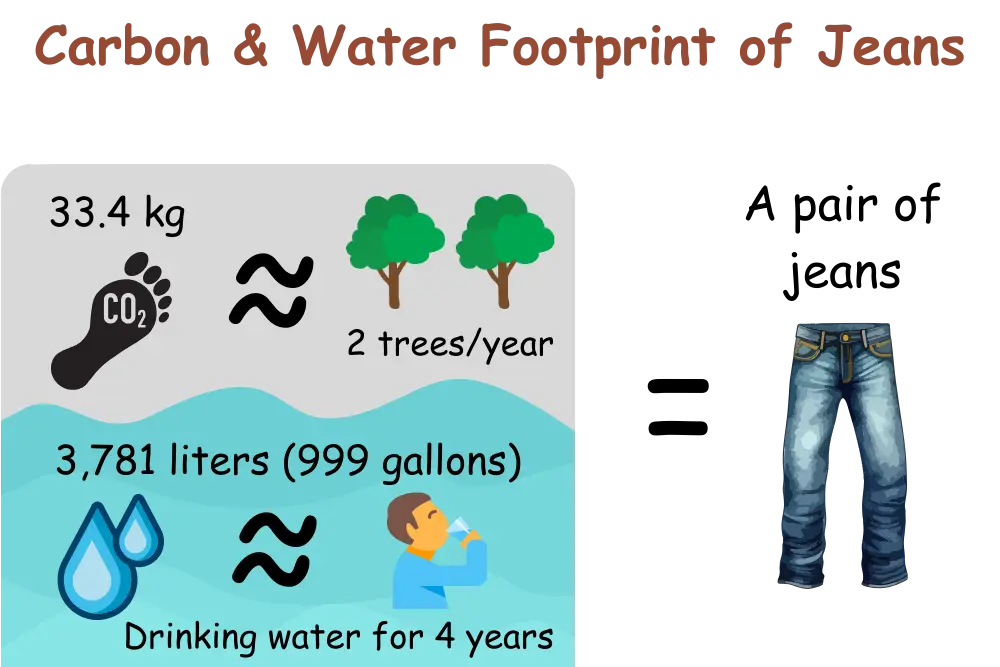
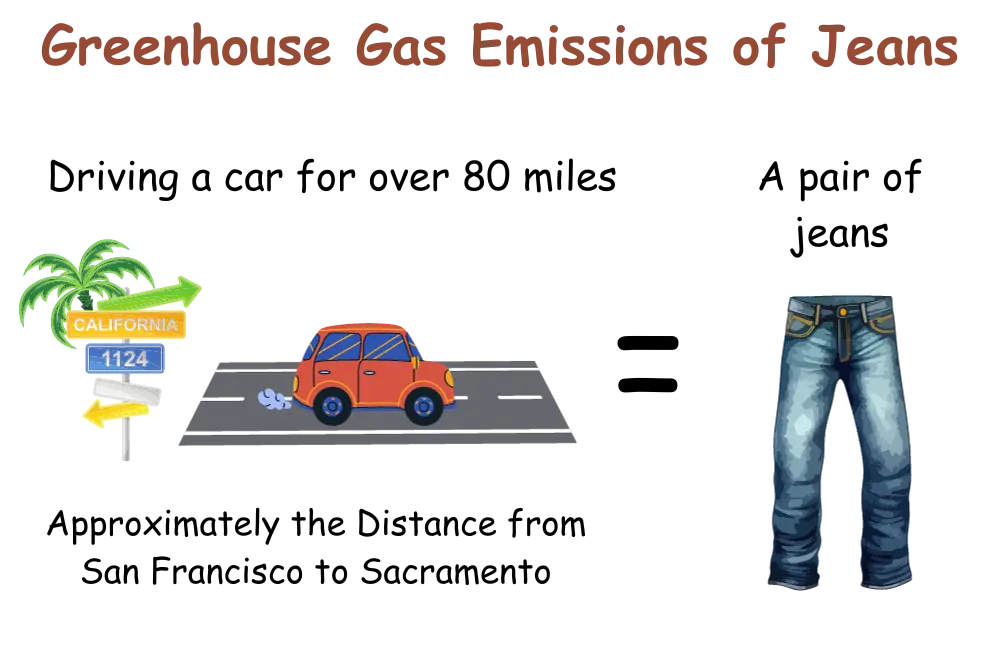
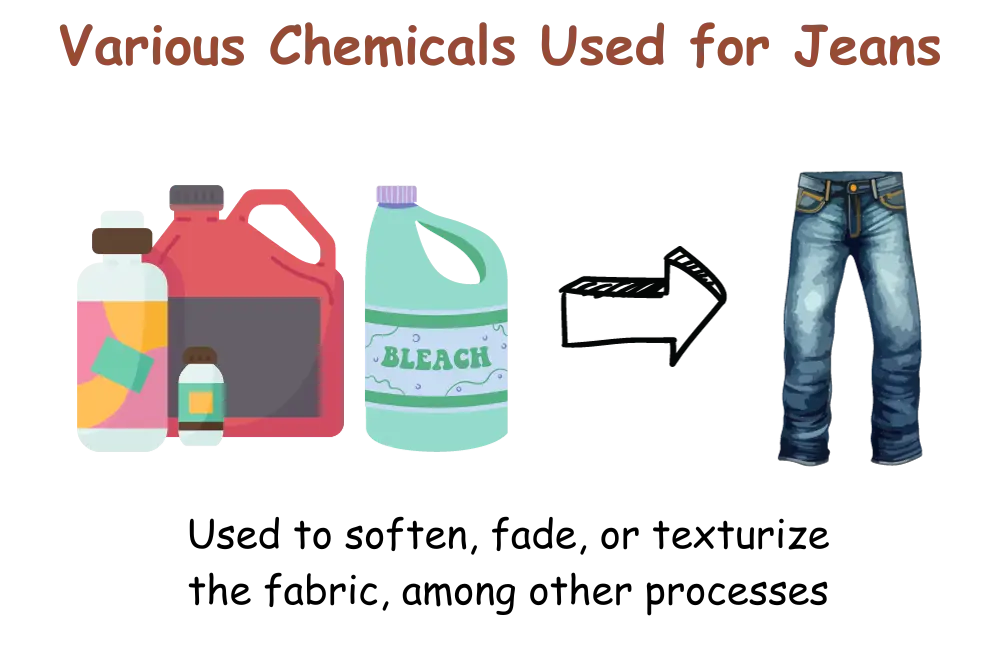
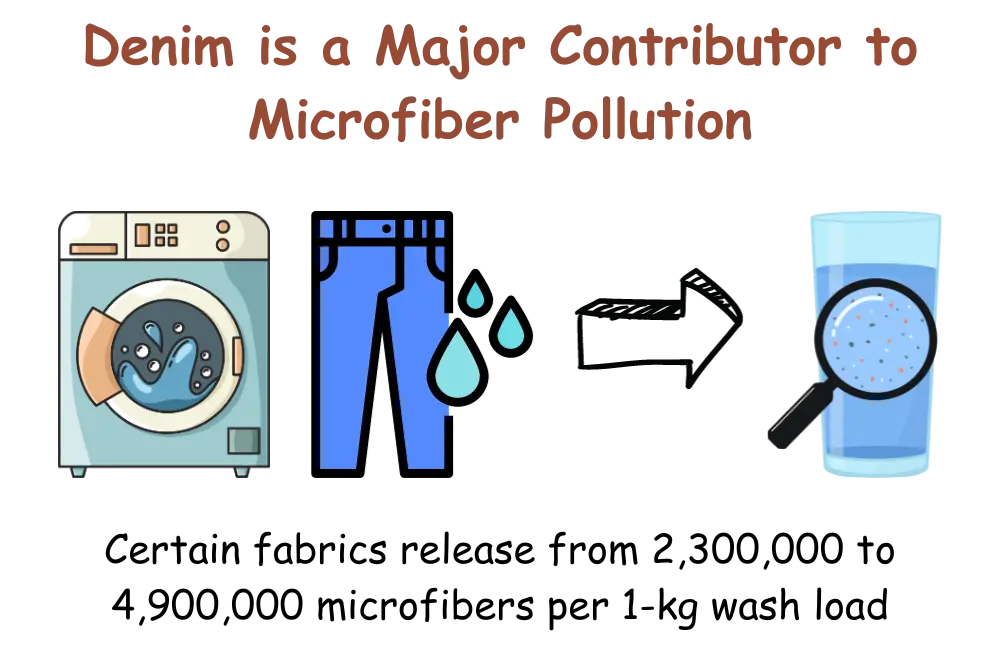
What Consumers Can Do
Buy less, choose well: Opt for quality over quantity to ensure longevity of the jeans.
Sell used clothes: Use second-hand apps like Vinted to sell your used clothes.
Wear the denim you have as long as possible and forgo “fast fashion.”
Opt for cold water cycles and wash your jeans less frequently to minimize the release of microfibers into the environment.
 AI
AII choose brands based on the essential sustainability certifications and standards, specifically for jeans manufacturers.
Nudie Jeans
Nudie Jeans is a Swedish denim brand founded in 2001. The brand emphasizes sustainability and social responsibility in its business practices. They believe that “the more you wear and repair jeans, the more character they have”. Nudie Jeans is committed to creating jeans without compromising the environment or the well-being of everyone involved in the production chain.


Price Range: $90 – $387
Key Sustainable Features:
- Uses 100% organic cotton in all their denim
- Offers free repairs for life, promoting longevity and reducing waste
- Recycles old products
- In 2022, repaired 65,386 pairs of Nudie jeans worldwide
- All denim is made from 100% organic cotton since 2012
- Works with living wages, sustainable fibre use and transparency of the supply chain
Taylor Stitch
Taylor Stitch is a men’s lifestyle company based in San Francisco, California. The brand is committed to creating long-lasting, more-responsible menswear. Their unique mission is to disrupt the fashion industry by pioneering new ways to source, sew, and sell. They aim to build products that wear in, not out, and get better with age.


Price Range: $150 – $198
Key Sustainable Features:
- Transitions to 100% organic cotton for over 99% of cotton products
- Utilizes up-cycled cotton and recycled polyester
- Uses 100% post-consumer recycled fibers for packaging
- Offers a long-haul guarantee for repairing or replacing gear
- Reuses deadstock fabrics
Outerknown
Outerknown is a sustainable clothing brand co-founded by pro-surfer Kelly Slater. The brand is known for its commitment to sustainability, transparency, and quality. Over 90% of Outerknown’s products are made from organic, recycled, or regenerated materials. The company’s manufacturing partners also follow strict guidelines of safety and working conditions.


Price Range: $78 – $188
Key Sustainable Features:
- Sources over 90% of the fibers organically or from recycled materials
- Complies with Fair Trade USA’s ethical practices and FLA accreditation
- Operates Outerworn, a platform where customers can buy and sell preloved Outerknown clothing
- Plans to be powered by 100% renewable energy by 2030
- Works with two B Corp Certified suppliers and has 8 facilities running on renewable energy
Patagonia
Patagonia is an American retailer of outdoor recreation clothing, founded by Yvon Chouinard in 1973. The brand is renowned for its commitment to sustainability, with a core philosophy of reducing environmental impact through responsible production practices and sourcing environmentally friendly materials.
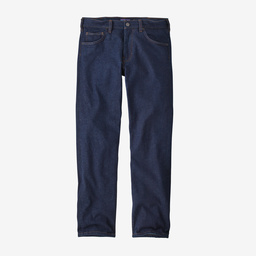

Price Range: $54 – $129
Key Sustainable Features:
- Utilizes innovative dye processes to reduce water, energy, and chemical use in their men’s 100% organic cotton jeans
- Operates the Worn Wear program, an e-commerce shop where customers can buy secondhand Patagonia products
- Donates 1% of the company’s annual sales to good causes through the non-profit 1% for the Planet
- Aims to be carbon-neutral by 2025, source 100% of their energy from renewable energies, and increase their percentage of recycled materials
- Announced a new corporate structure in 2022, giving away 98% of its stocks to a non-profit
- Uses 98% recycled materials in its product lines
Levi’s
Levi Strauss & Co. is a globally recognized American clothing company, best known for its Levi’s brand of denim jeans. Founded in 1853, the brand has a strong commitment to sustainability, with a focus on reducing environmental impact through innovative practices and the use of sustainable materials.


Price Range: $49-395
Key Sustainable Features:
- Aims to acquire 100% sustainably sourced cotton by 2025
- Plans to implement 100% renewable energy in owned and operated facilities by 2025
- Commits to reducing 40% of greenhouse gas emissions in their supply chain by 2030
- Strives to use 50% less water in water-stressed areas by 2030
- Utilizes high-quality recycled denim, saving on water, chemical, and CO2 footprint of their jeans
- Operates under three main sustainability pillars — climate, consumption, and community — to guide their sustainability strategy
Friendly Blues
Friendly Blues is a family-owned business that launched an exclusively recycled denim brand in 2022. They aim to provide eco-friendly jeans to their eco-conscious community with premium, sustainably produced, affordable denim. Their mission is “Comfort With A Conscience”, and they are fully committed to championing a clean, eco-friendly industry.


Price Range: $60
Key Sustainable Features:
- Uses Recycled French Terry Fabric in their jeans, creating sustainable, super soft, and comfortable products
- All of Friendly Blues’ Jeans are ethically sourced and crafted sustainably
- They started producing and selling their recycled fabrics in 2015
- They dream of expanding their sustainable fashion offering and helping lessen the impact on the environment by creating eco-friendly jeans
unspun
unspun is a US-based fashion company with technology at its core. The brand’s mission is to reduce global human carbon emissions by 1% through automated, localized, and intentional manufacturing for apparel. unspun is known for its innovative 3D weaving technology, Vega™, which weaves yarn directly into clothing, quickly and efficiently.
Price Range: $200 – $215
Key Sustainable Features:
- Uses 3D weaving technology for apparel, transforming yarn into clothes in minutes
- Aims to reduce global carbon emissions by 1%
- Practices automated, localized, and low-impact production
- Operates a zero-inventory business model
- Committed to streamlining and decarbonizing fashion supply chains
- Prioritizes size inclusivity, offering customizable fits for all body types
- Uses low-impact non-toxic dyes and fabrics in most of its products
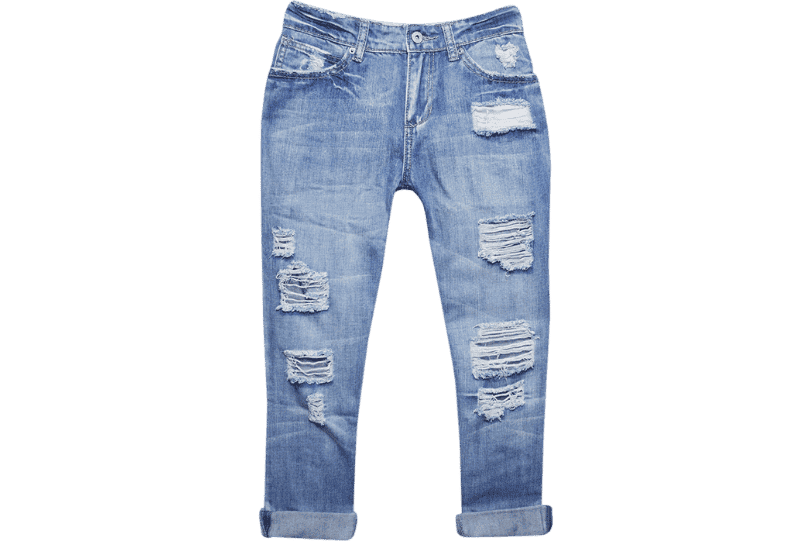

Warp + Weft
Warp + Weft is a family-owned denim brand acclaimed for its eco-friendly ethos. Known for using less than 10 gallons of water per pair of jeans and recycling 98% of this water, the brand avoids harmful bleaching through Dry Ozone technology. They emphasize ethical labor practices, offering a range of sizes for inclusivity, all while maintaining high quality at affordable prices


Price Range: Under $100
Key Sustainable Features:
- Drastically reduces water usage in manufacturing, using less than 10 gallons per pair of jeans
- Recycles 98% of the water used in production
- Utilizes eco-friendly Dry Ozone technology instead of traditional bleaching
- Complies with International Social and Environmental & Quality Standards
- Committed to ethical labor practices, including fair wages and safe working conditions
- Focuses on inclusivity with a wide range of sizes and fits in their collections
Everlane
Everlane is an American clothing retailer that primarily sells online. The company is headquartered in San Francisco, California. Everlane was founded with the mission of selling clothing with transparent pricing. They are committed to revealing the true costs behind all of their products—from materials, to labor, to transportation.
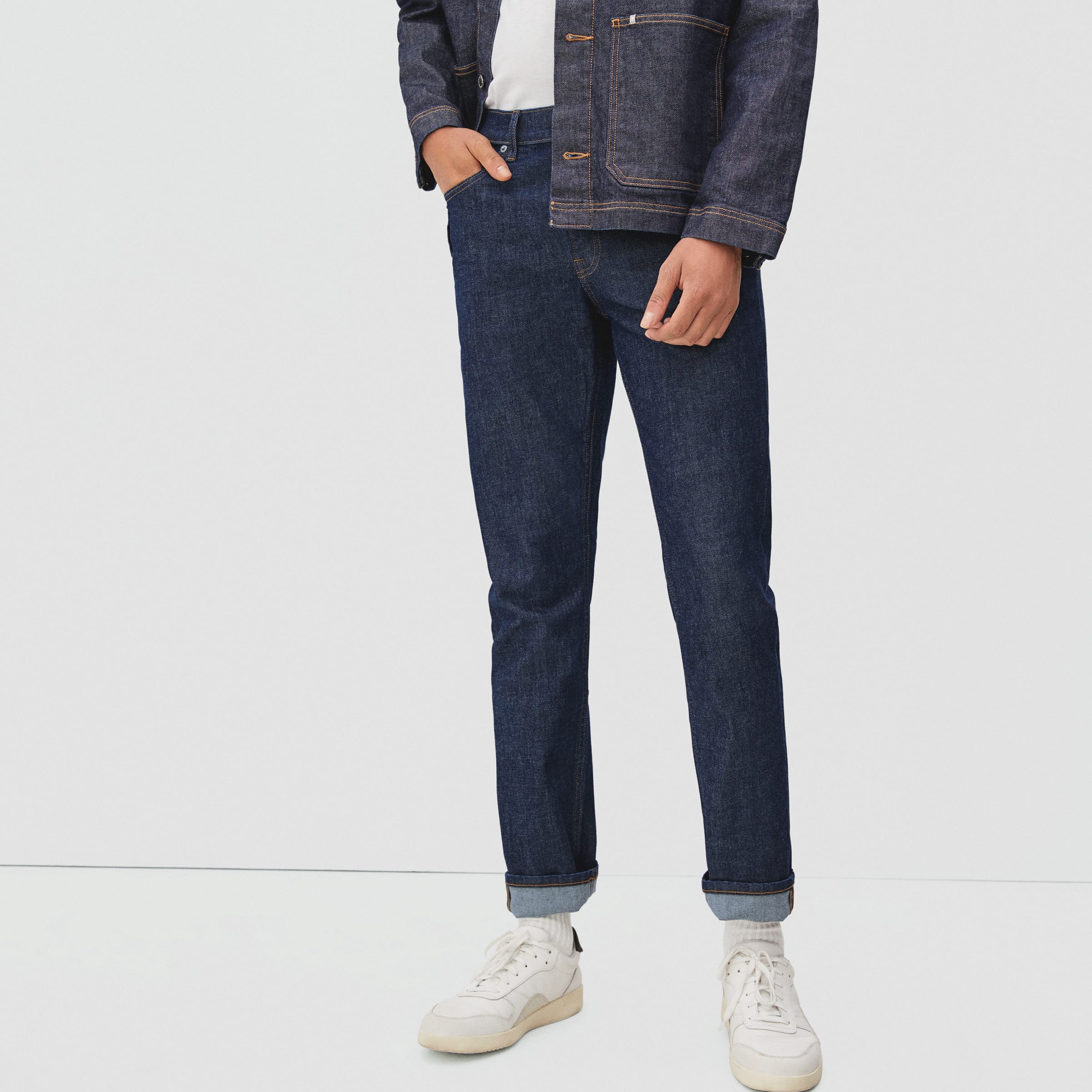

Price Range: $68 – $148
Key Sustainable Features:
- Launched ReNew, a line of outerwear crafted from materials created out of 3 million recycled plastic bottles
- Set tangible goals for 2023 to reduce carbon emissions per product by 55% and absolute emissions in stores and HQ by 46%
- Aims to achieve net-zero emissions by 2050
- Aims to identify high-GHG fibers and replace them with innovative lower-impact alternatives
- Plans to partner with farmers in their supply chain to support and adopt regenerative agricultural practices
Hiut Denim
Hiut Denim is a Welsh denim brand that has brought jeans production back to the town of Cardigan. The brand is committed to making high-quality jeans by hand, using a combination of world-class skill and technological innovation. They believe in doing one thing well, and that’s making jeans.


Price Range: $175 – $285
Key Sustainable Features:
- Sources 100% Cotton Denim from the Candiani Mill in Italy, the most sustainable denim mill in the world
- Operates as a zero-waste company
- Produces a small-batch run of sustainable jeans that uses 75% less water and 65% fewer chemicals
- Develops a 100 percent biodegradable stretch denim fabric that does not compromise elasticity and recovery properties. The result is a jean that is also micro-plastic free
- Takes about one hour and 10 minutes to make one pair, compared with 11 minutes at a highly mechanised jeans industry giant. And rather than staff doing just one part of the manufacturing process, each machinist at Hiut makes a pair of jeans from start to finish
Explore Sustainability Certifications and Standards for the Jeans Industry
- Global Organic Textile Standard (GOTS): A worldwide recognized standard for organic textiles, ensuring environmentally and socially responsible manufacturing.
- Better Cotton Initiative (BCI): A leading sustainability initiative for cotton, aiming to protect and restore the environment while helping cotton communities.
- Bluesign: A Swiss group that monitors the journey of materials from factory to final product, ensuring safe and responsible manufacturing.
- Business Social Compliance Initiative (BSCI): A global standard that sets requirements for third-party verification of the social compliance of facilities and organizations in any industry.
- Cradle to Cradle Certified™ Products Program: A globally recognized sustainable sourcing model that improves livelihoods, protects the environment, and builds resilient, transparent supply chains.
- Fair Trade Certified™: A globally recognized sustainable sourcing model that improves livelihoods, protects the environment, and builds resilient, transparent supply chains.
- OEKO-TEX® Standard 100: A globally standardized, independent testing and certification system for safer textiles.
- SA8000® Standard: A globally recognized social certification standard that provides a holistic framework for fair treatment of workers.
- B Certified Corporation: A certification given to companies that meet certain social and environmental standards by B Lab, a nonprofit organization.
- Jeans Redesign Guidelines: Guidelines developed by the Ellen MacArthur Foundation to encourage brands, mills, and manufacturers to transform the way jeans are designed and made.
- Fairtrade International: Changes the way trade works through better prices, decent working conditions, and a fairer deal for farmers and workers in developing countries.
- Fair Labor Association (FLA): Promotes human rights at work by building expertise and driving innovation to improve business policies and practices that benefit workers.
- World Fair Trade Organization (WFTO): The global community and verifier of enterprises that fully practice the 10 Fair Trade Principles.
- Better Cotton: A certification system that trains farmers to use water efficiently, care for soil health and natural habitats, reduce the use of harmful chemicals, and respect workers’ rights.
- OEKO-TEX® MADE IN GREEN: A traceable product label for textiles and leather products manufactured in environmentally friendly facilities under safe and socially responsible working conditions.
- OEKO-TEX® STeP certification: An independent certification system for brands, retailers, and manufacturers from the textile and leather industry, focusing on environmentally friendly and socially responsible production facilities.
- DETOX TO ZERO: A verification system for suppliers of brands and retailers who have made a commitment to the Greenpeace DETOX campaign.

